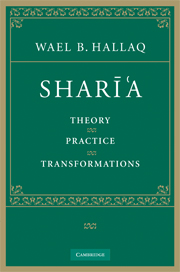Introduction
Published online by Cambridge University Press: 05 June 2012
Summary
The prisons of language and modernity
To write the history of Sharīʿa is to represent the Other. Yet, such a representation brings with it an insoluble problem that ensues from our distinctly modern conceptions and modern “legislation” of language. As our language (in this case, obviously, twenty-first-century English) is the common repository of ever-changing modern conceptions, modern categories and, primarily, the nominal representation of the modern condition, we stand nearly helpless before the wide expanse of what we take to be “Islamic law” and its history. Our language fails us in our endeavor to produce a representation of that history which not only spoke different languages (none of them English, not even in British India), but also articulated itself conceptually, socially, institutionally and culturally in manners and ways vastly different from those material and non-material cultures that produced modernity and its Western linguistic traditions.
Take for instance the most central concept underlying this study, the very term “law.” Arguably, cultural and conceptual ambiguities related to this term (never to my knowledge identified, let alone problematized, by legal Orientalism) are responsible for a thorough and systematic misunderstanding of the most significant features of the so-called Islamic law. Subjected to critical scrutiny in Europe for over a century, Islamic law could only disappoint. It could never match up to any version of European law. It was seen as ineffective, inefficient, even incompetent. It mostly applied to the “private” sphere of personal status, having early on “divorced” itself from “state and society.”
Information
- Type
- Chapter
- Information
- Sharī'aTheory, Practice, Transformations, pp. 1 - 24Publisher: Cambridge University PressPrint publication year: 2009
